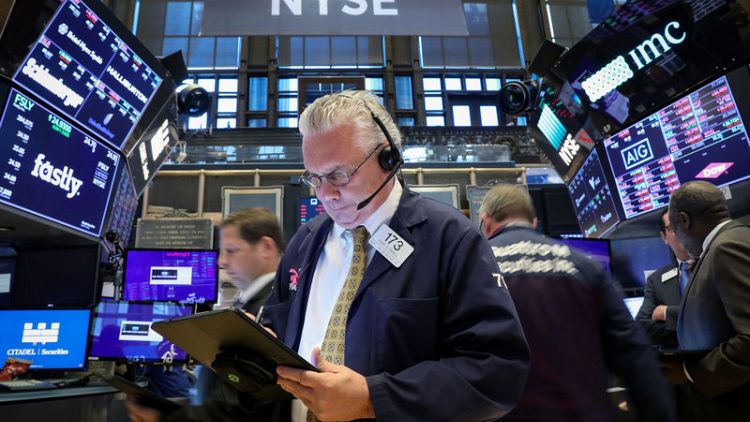By Caroline Valetkevitch
NEW YORK (Reuters) - U.S. stocks will build on this year's already strong gains over the rest of 2019 despite growing U.S.-China trade tensions that represent the biggest threat to the market, according to a Reuters poll of strategists.
The benchmark S&P 500 index will finish 2019 at 2,925, up about 4.4% from Tuesday's close, based on the median forecast of 50 strategists polled by Reuters in the last two weeks. It would represent a gain of 16.7% from the end of 2018.
Most strategists in the poll cited further escalation in the U.S.-China trade war as the biggest potential negative over the coming year, followed by a worse-than-expected U.S. economic slowdown and slower earnings growth.
Rising intensity in the trade war is likely the biggest risk since it could affect so many other areas, said Sam Stovall, chief investment strategist at CFRA.
"It could have a cascading effect on the global economy and corporate profit growth, which could cause shares to become overvalued," Stovall said.
The overwhelming majority of strategists in the U.S. poll also said the risk for stocks is skewed more toward the downside than the upside.
Although the S&P 500 remains up about 12% for the year so far, stocks have sold off recently amid persistent worries over the trade battle. The Dow Jones industrial average last week registered its fifth straight week of declines, its longest such losing streak in eight years.
Adding to tensions, Washington effectively banned U.S. firms from doing business with Huawei Technologies Co Ltd, the world's largest telecoms network gear maker, citing national security concerns.
"Companies are getting more worried about the sanctions in the ramp up in this trade war than they are about tariffs," said Anthony Saglimbene, global market strategist at Ameriprise Financial in Troy, Michigan, noting technology companies could be hit the hardest.
Still, strategists were slightly more optimistic about the S&P 500's potential gains in 2019 than they were in a Reuters poll in February, when the median target for the index was 2,900.
Many investors remain hopeful of an eventual trade agreement, and some expect the market to weather the turbulence well.
"It's kind of the risk du jour. Ultimately, the likelihood it actually hurts the economy enough to drive stock prices meaningfully lower is limited. The market right now is still quite healthy," said Jonathan Golub, chief U.S. equity strategist at Credit Suisse in New York.
Signs earlier this year that the trade war would be over soon and signals from the Federal Reserve that it will not raise interest rates anytime soon have driven much of this year's gains.
Few strategists cited valuations as a big concern at this point.
Stock valuations recently climbed to levels reached just before Wall Street's 2018 plunge, but have eased in recent days. The S&P 500 index peaked last year on Sept. 20, before sliding nearly 20% over the next three months.
At 16.5, the forward price-to-earnings ratio for the index, which compares stock prices to estimated earnings over the next year, remains above its historic average of about 15, according to data tracked by Refinitiv.
The first-quarter U.S. earnings season has been mostly better than expected and has eased worries among some investors that the S&P 500 would have a "profit recession" of at least two straight quarters of declining earnings this year, but profit growth still is expected to remain well below 2018's levels.
With results in from almost all of the S&P 500, first-quarter earnings now are expected to have risen 1.5% from a year ago versus a 2.0% decline estimated at the start of April, according to IBES data from Refinitiv.
For all of 2019, analysts are forecasting profit growth of just 3.0%, down sharply from 2018's tax-cut fuelled earnings growth of 24.1%.
Investors expect tariffs could lift corporate costs and lower profit margins, while continued uncertainty surrounding a trade deal will hinder the ability of companies to plan or make capital expenditures.
The poll also showed the Dow finishing 2019 at 26,000. That would represent a gain of 2.6% from Tuesday's close and an increase of 11.5% percent from the end of 2018.
(Reporting by Caroline Valetkevitch; additional reporting by Stephen Culp, Lewis Krauskopf, Sinead Carew, Chuck Mikolajczak, April Joyner and Alden Bentley in New York and Noel Randewich in San Francisco; additional polling by Indradip Ghosh, Mumal Rathore and Sumanto Mondal in Bengaluru; editing by Nick Zieminski and Susan Thomas)



